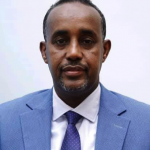Politics
Somalia Politics
This page explores Somalia’s political structure incorporating real-time RSS feed news and videos. By harnessing the power of RSS feeds, visitors can stay informed about the latest developments in Somalia’s politics as they happen. The dynamic nature of these feeds ensures that users receive up-to-the-minute updates on political events, policy changes, and significant milestones, enabling them to stay abreast of the ever-evolving political scene.

Hussein Roble
20th Prime Minister of Somalia
Incumbent
Assumed office
23 September 2020
Image credit
Somalia, located in the Horn of Africa, has a complex political landscape characterized by ongoing challenges and the quest for stability. The country has experienced a prolonged period of political instability, armed conflict, and the absence of a functioning central government.
The political situation in Somalia is defined by a federal parliamentary system, although the country’s political structure has been fragmented and marked by regional and clan-based divisions. Somalia has made efforts to establish a federal system with a bicameral parliament consisting of the House of the People (lower house) and the Upper House. Members of Parliament are elected through a clan-based power-sharing formula.
The country has faced numerous challenges, including armed conflict, terrorism, piracy, and humanitarian crises. The collapse of the central government in 1991 led to a power vacuum, which was filled by regional administrations and clan-based militias. Efforts to rebuild a strong central government have been complicated by the presence of armed groups, such as Al-Shabaab, which have posed security threats and impeded stability. International actors, including the African Union Mission in Somalia (AMISOM) and other partners, have played a crucial role in supporting Somalia’s political processes, security, and development. These efforts have aimed to help establish a functioning government, promote reconciliation, and build state institutions.
The country has made progress in recent years, including the successful organization of parliamentary and presidential elections in 2016 and 2021, respectively. However, significant challenges remain, including achieving broader political inclusivity, consolidating security gains, and ensuring the delivery of essential services to the population. Economic development and social welfare are critical aspects of Somalia’s political agenda. The country has abundant natural resources and a strategic location for trade and investment. However, addressing poverty, unemployment, and rebuilding infrastructure remain pressing priorities.
The path to stability and progress in Somalia depends on sustained efforts to strengthen governance, promote reconciliation, and address security challenges. Establishing a broad-based political consensus, building effective state institutions, and fostering economic opportunities are crucial for the country’s political and social transformation. International support and collaboration are vital in helping Somalia overcome its challenges and chart a path towards a peaceful and prosperous future.
Unless other sources are cited, original content is provided by ChatGPT. ChatGPT may produce inaccurate information about people, places, or facts. #Somalia #SomaliaPolitics #SomaliaNews #SomaliaNewsToday #SomaliaRSSFeed #BlahFace



